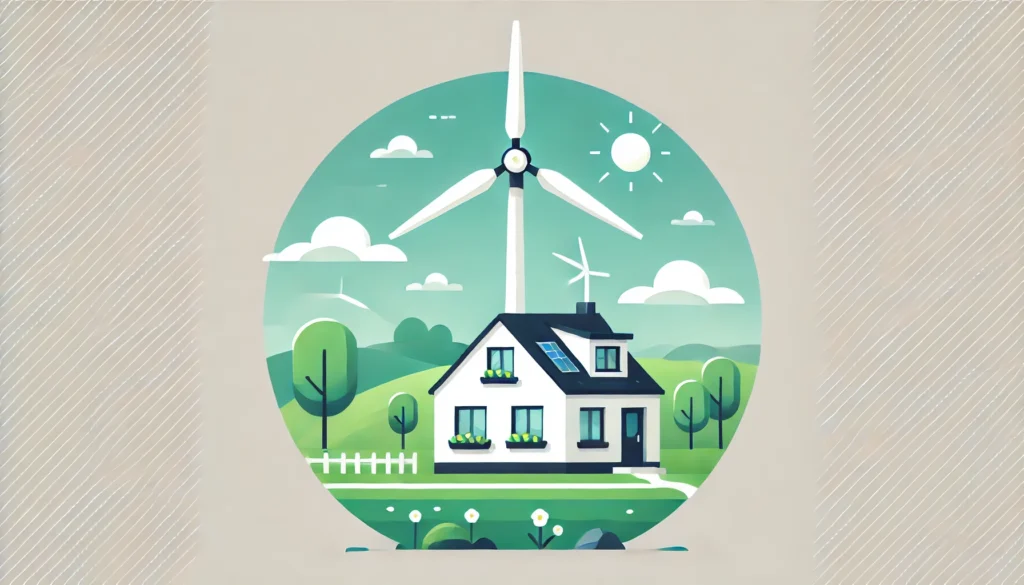
As the world shifts towards more sustainable energy sources, small wind turbines have emerged as a viable option for homeowners looking to reduce their carbon footprint and lower their energy bills. In Ireland, with its ample wind resources, small wind turbines can be an effective way to harness renewable energy right at home. This article explores the benefits, installation process, and considerations for using small wind turbines to power your Irish home.
Benefits of Small Wind Turbines
Environmental Benefits
- Reduction in Carbon Emissions: Small wind turbines produce clean energy, significantly reducing greenhouse gas emissions compared to fossil fuels.
- Sustainability: Wind energy is a renewable resource, meaning it will never run out. By investing in wind power, homeowners contribute to a more sustainable future.
Financial Benefits
- Lower Energy Bills: Generating your own electricity can greatly reduce or even eliminate your electricity bills. Over time, the savings can offset the initial cost of the turbine.
- Government Incentives: The Irish government offers grants and incentives for renewable energy installations, making it more affordable for homeowners to invest in small wind turbines.
Energy Independence
- Reduced Reliance on the Grid: By generating your own power, you reduce your dependence on the national grid, providing greater energy security.
- Protection Against Rising Energy Costs: As energy prices continue to rise, generating your own electricity can protect you from increasing utility bills.
Types of Small Wind Turbines
Horizontal-Axis Wind Turbines (HAWTs)
- Description: The most common type, with blades that rotate around a horizontal axis.
- Advantages: Typically more efficient and can capture more wind due to their higher elevation.
- Ideal Use: Best suited for rural areas with consistent wind speeds.
Vertical-Axis Wind Turbines (VAWTs)
- Description: Blades rotate around a vertical axis, allowing them to capture wind from any direction.
- Advantages: Can operate in lower wind conditions and are often quieter.
- Ideal Use: Suitable for urban or suburban areas where wind direction is variable.
Installation Process
Site Assessment
- Wind Speed Measurement: Conduct a wind speed assessment to ensure your site has adequate wind resources. Average wind speeds of at least 5 meters per second are ideal.
- Location Selection: Choose a location that is free from obstructions like trees and buildings to maximize wind exposure.
Planning and Permits
- Planning Permission: In Ireland, planning permission is usually required for installing a wind turbine. Check with your local authority for specific requirements.
- Environmental Impact: Assess the potential environmental impact, including noise and visual effects, and address any concerns from neighbors or the community.
Installation Steps
- Foundation Preparation: Install a sturdy foundation to support the wind turbine tower. This may involve pouring a concrete base.
- Tower Erection: Erect the tower and secure it to the foundation. Ensure it is properly anchored and stable.
- Turbine Mounting: Attach the turbine to the tower, ensuring all components are securely connected.
- Electrical Connections: Connect the turbine to your home’s electrical system. This should be done by a qualified electrician to ensure safety and compliance with regulations.
Maintenance and Monitoring
Regular Inspections
- Blade Inspection: Check the blades for damage or wear and tear, especially after severe weather.
- Electrical Components: Regularly inspect electrical connections and the inverter to ensure they are functioning correctly.
Performance Monitoring
- Energy Output: Use monitoring systems to track the energy output of your wind turbine. This helps you understand its efficiency and identify any issues early.
- Maintenance Schedule: Follow a regular maintenance schedule to keep your turbine in optimal condition. This includes lubricating moving parts and tightening bolts.
Considerations for Homeowners
Cost
- Initial Investment: The cost of small wind turbines varies, typically ranging from €5,000 to €30,000 depending on the size and type.
- Long-Term Savings: Calculate the potential long-term savings on energy bills to determine the return on investment.
Noise and Aesthetics
- Noise Levels: Modern turbines are designed to be quieter, but some noise is inevitable. Consider the potential impact on your household and neighbors.
- Visual Impact: Wind turbines can be visually prominent. Choose a design and location that minimize the visual impact while maximizing efficiency.
Suitability
- Wind Conditions: Ensure your location has sufficient wind resources to make the investment worthwhile.
- Space Availability: Ensure you have enough space for the turbine and that it won’t interfere with other structures or activities on your property.
Government Support and Incentives
SEAI Grants
- Overview: The Sustainable Energy Authority of Ireland (SEAI) offers grants for renewable energy installations, including wind turbines.
- Application Process: Visit the SEAI website to learn about available grants and the application process. Ensure you meet all eligibility requirements and provide the necessary documentation.
